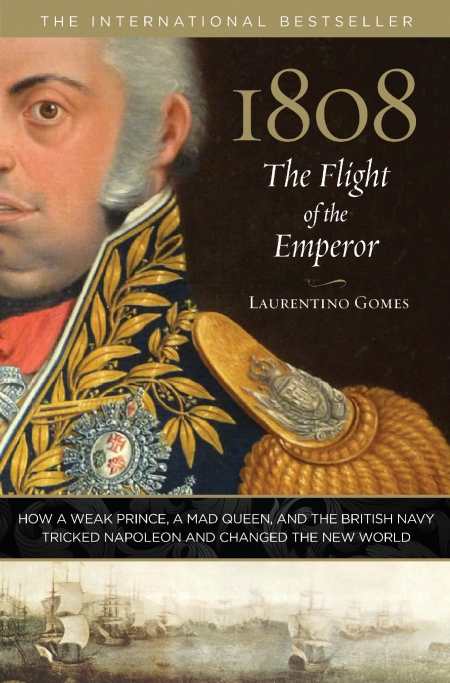1808: The Flight of the Emperor
How a Weak Prince, a Mad Queen, and the British Navy Tricked Napoleon and Changed the New World
This vivid portrait of an unkempt, self-preserving king provides insight into the obscure history of Brazil.
The origins of the Portuguese influence in Brazil are not well known to most people, from the first Portuguese explorer’s landing in 1500 to Brazil’s eventual independence in 1822. Laurentino Gomes sheds light on a critical transition in Brazil’s history in 1808: The Flight of the Emperor, the first volume in his trilogy of Brazilian history. Published in Portuguese in 2007, this edition, translated by Andrew Nevins, is the first English version.
The book starts with Portugal under threat by Napoleon’s forces and the royal court deciding to escape by acting on long-considered plans to move itself to its prize colony and major source of wealth: Brazil. It’s a bold plan but, given the limited alternatives, possibly the only viable one.
After the landing, Gomes proceeds with a meticulous and encyclopedic account of life in the colony of Brazil, as well as the doings of the Portuguese royalty in their new home. This is a story in which the main character, Dom João (later King João VI), is not easily classified—he’s certainly not heroic, but neither is he a villain. Unfortunately, he’s also not terribly conflicted, or particularly interesting. Despite a queen who’s classified as insane, there are no other major players that light up the reading—Napoleon is a distant figure in most of the book, and there isn’t a lot of excitement, for example, in the dry historical accounts of traders.
Despite the intrigue around the royal departure, this is mostly the story of an unexceptional, unattractive, and unkempt king who feared Napoleon, thunder, and crustaceans. Important decisions were delegated to others, and even his role in the development of Brazil’s important institutions seems limited to an extended sense of self-preservation. The king’s return to Portugal is similarly driven more by the demands of others than a sense of monarch’s responsibility. Given the lack of an outstanding central figure, maybe it’s clear why this remains a somewhat obscure bit of history.
Obscure or not, it is important knowledge for understanding how modern-day Brazil, a diverse mix of the ancestors of Europeans, slaves, and natives, was created. As Gomes writes: “No other period of Brazilian history has witnessed such profound, decisive, and rapid changes as those thirteen years in which the Portuguese court resided in Rio de Janiero. Within that span, Brazil transformed from a closed and backward colony into an independent nation.”
Gomes tells that story completely, with vivid accounts from historians as well as original sources. In 1808: The Flight of the Emperor, he sets the stage for the future volumes of his trilogy and gives readers interested in the history of Brazil much to anticipate.
Reviewed by
Peter Dabbene
Disclosure: This article is not an endorsement, but a review. The publisher of this book provided free copies of the book to have their book reviewed by a professional reviewer. No fee was paid by the publisher for this review. Foreword Reviews only recommends books that we love. Foreword Magazine, Inc. is disclosing this in accordance with the Federal Trade Commission’s 16 CFR, Part 255.

